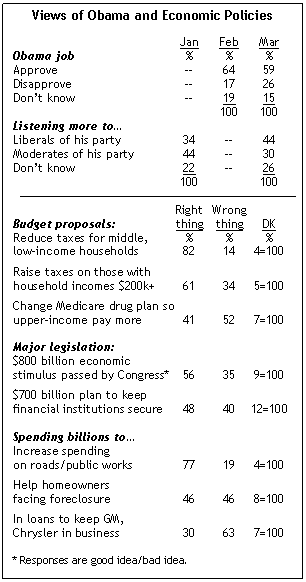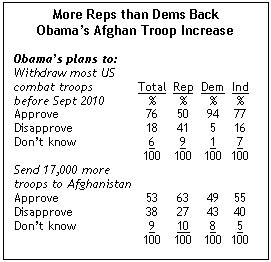Overview
President Barack Obama’s approval rating has slipped, as a growing number of Americans see him listening more to his party’s liberals than to its moderates and many voice opposition to some of his key economic proposals. Obama’s job approval rating has slipped from 64% in February to 59% currently, while disapproval has jumped from 17% to 26% over this period.
 Although most people think the new president is doing as much as he can to fix the economy and relatively few say Obama’s policies have made the economy worse, the public expresses mixed views of his many major proposals to fix the economy. There continues to be broad support for increased spending on infrastructure, and most have positive views of key aspects of his budget plan – reducing taxes on middle and lower-income households and raising taxes on the affluent.
Although most people think the new president is doing as much as he can to fix the economy and relatively few say Obama’s policies have made the economy worse, the public expresses mixed views of his many major proposals to fix the economy. There continues to be broad support for increased spending on infrastructure, and most have positive views of key aspects of his budget plan – reducing taxes on middle and lower-income households and raising taxes on the affluent.
Yet a majority (52%) says it is wrong to change the Medicare prescription drug plan so that upper-income retirees would pay more. And nearly as many (47%) express a negative view of reducing agricultural subsidies for many farms, as Obama has proposed in his budget plan.
As in December, the public is divided over spending billions to help homeowners who are facing foreclosure on mortgages they cannot afford – 46% say this is the right thing for the government to be doing while an identical percentage says it is wrong. And the prospect of providing loans to struggling automakers GM and Chrysler, which was unpopular in December, has become even more so: Just 30% say it is right for the government to provide loans to the automakers, down from 39% in December
The latest national survey by the Pew Research Center for the People & the Press, conducted March 9-12 among 1,308 adults reached on landlines and cell phones, finds that 56% of Americans view Obama’s $800 billion economic stimulus plan as the right thing for the government to be doing, compared with 35% who say it is the wrong thing. This is little changed since February. About half (48%) express a positive opinion of the $700 billion program aimed at keeping financial institutions and markets secure; in December 47% said this was the right thing for the government to be doing.
 There are no signs in the poll that Republican congressional leaders are benefiting from the public’s concern about major economic policies. In fact, approval of Republican congressional leaders has fallen from 34% in February to 28% currently, the lowest rating for GOP leaders in nearly 14 years of Pew Research surveys. Republicans, in particular, have become less supportive of their party’s leaders in Congress: just 43% of Republicans approve of their job performance, down from 55% just a month ago. By contrast, nearly half of Americans (47%) approve of the job Democratic congressional leaders are doing.
There are no signs in the poll that Republican congressional leaders are benefiting from the public’s concern about major economic policies. In fact, approval of Republican congressional leaders has fallen from 34% in February to 28% currently, the lowest rating for GOP leaders in nearly 14 years of Pew Research surveys. Republicans, in particular, have become less supportive of their party’s leaders in Congress: just 43% of Republicans approve of their job performance, down from 55% just a month ago. By contrast, nearly half of Americans (47%) approve of the job Democratic congressional leaders are doing.
In addition, no single Republican figure, either in Congress or elsewhere, has emerged as the party’s leader. When asked who they think of as the leader of the Republican Party, 73% either say they do not know (58%), or volunteer that there is no leader (15%). John McCain is mentioned most frequently, but just 11% name the Arizona senator as leader of the Republican Party.
While Obama’s job approval ratings have edged down, they remain on par with George W. Bush’s ratings in March 2001 (55% approved, 25% disapproved). The balance of opinion regarding Obama is more positive than it was for Clinton in March 1993: At that time, 53% gave Clinton a positive job rating compared with 34% who gave him a negative rating.
Since February, views of the new president have become much more partisan. Currently, just 27% of Republicans approve of the way he is handling his job while 56% disapprove. In February, 34% of Republicans approved of Obama’s job performance and 41% disapproved. Democrats continue to express overwhelmingly positive views of Obama (88% approve), while more than twice as many independents approve (57%) as disapprove (27%) of his job performance. However, the balance of opinion among independents was much more positive in February (63% approve, 14% disapprove).
Obama generally receives favorable marks for doing as much as he can to try to fix the economy. Six-in-ten express this view, which is substantially greater than the percentages saying that about George W. Bush in January 2002 (48%) or George H.W. Bush a decade earlier (21% in March 1992). For the most part, the public says that Obama’s economic policies have had no effect on the economic situation so far (64%), with much smaller proportions saying his policies have made economic conditions worse (15%) or better (14%).
Nonetheless, a sizable minority (39%) says that Obama has proposed spending too much money to address the economic situation; 34% say Obama is spending the right amount, while 13% say Obama has proposed spending too little to address the crisis. Seven-in-ten Republicans (70%) say Obama’s proposals are too costly, compared with 40% of independents and just 17% of Democrats.
In this regard, 37% of Americans say that the growing budget deficit makes them angry, while another 46% say it is something that bothers them but does not make them angry. Comparable percentages say they are angered by bailing out homeowners who took out mortgages they could not afford (39%) and government money being spent on special interest projects (34%). The bailout of banks and financial institutions that made poor decisions engenders more negative reactions – 48% say this is something that makes them angry.
 As Obama dramatically expands the role of government, the public is reacting pragmatically: While there is strong support for the free market, and a plurality favors a smaller government, most also believe the government should exert more control over the economy than it has in recent years.
As Obama dramatically expands the role of government, the public is reacting pragmatically: While there is strong support for the free market, and a plurality favors a smaller government, most also believe the government should exert more control over the economy than it has in recent years.
Seven-in-ten (70%) say that people are better off in a free market even if there are severe ups and downs at times. Since last fall, there has been a modest rise in the percentage saying a smaller government with fewer services is preferable to a bigger government with more services (from 42% to 48%).
At the same time, however, 54% say it is a good idea for the government to exert more control over the economy than it has in recent years. Even among Republicans, nearly a third (32%) endorses the idea of the government now exerting greater control over the economy.
The most dramatic shift in opinion about Obama in the new survey is about whether he is listening more to his party’s moderates or liberals. By 44% to 30%, the public now sees him listening more to liberal Democrats rather than to moderate Democrats. This is a reversal from January when 44% said he was listening more to moderates in the Democratic Party, while 34% said he was listening more to the party’s liberals. The proportion of Republicans who see liberals having greater sway over Obama has increased by 23 points since January; the proportion of independents holding that view has risen 13 points.
Yet opinions about Obama’s own ideology have moved in the opposite direction since last fall. Currently, 44% say Obama is a liberal, while 26% say he is a moderate and 17% say he is a conservative. In October, during the final stages of the presidential race, 52% said Obama was a liberal, 23% a moderate, and 16% a conservative.
Democrats Cool to Afghanistan Buildup
 The public overwhelmingly supports Obama’s plan to remove most combat troops from Iraq by the end of August: 76% approve of the troop withdrawal while jus
The public overwhelmingly supports Obama’s plan to remove most combat troops from Iraq by the end of August: 76% approve of the troop withdrawal while jus
t 18% disapprove. In contrast, a much narrower majority (53%) approves of his decision to dispatch 17,000 additional U.S. forces to Afghanistan; 38% disapprove of the troop buildup.
While Democrats almost unanimously approve of Obama’s decision to pull most combat troops from Iraq by August of next year, only about half (49%) approve of his decision to send more U.S. forces to Afghanistan. Republicans strongly support Obama’s decision to increase troop levels in Afghanistan (by 63% to 27%), but are more evenly split over his decision to withdraw most combat forces from Iraq next year (50% approve while 41% disapprove). More than three-quarters of independents (77%) approve of Obama’s plan to withdraw most combat troops from Iraq before the fall of 2010, while a smaller majority (55%) approve of the decision to increase U.S. troop strength in Afghanistan.


